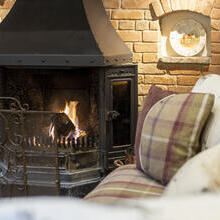Body text
The Air Quality (Domestic Solid Fuels Standards) (England) Regulations 2020 were introduced to reduce pollution caused by domestic fireplaces as part of the Government’s Clean Air Strategy. This strategy aims to reduce emissions of very small particulate matter under 2.5 micrometres in size (PM2.5), which can have many adverse health impacts. In the short term, these particles can irritate the eyes, nose and throat, and cause coughing, sneezing and shortness of breath. In the longer term, prolonged exposure to these small particles can cause permanent respiratory problems such as asthma, chronic bronchitis and heart disease.
The burning of fuels such as wet wood and house coal is known to produce large amounts of PM2.5, so to address this, the regulations place restrictions on the sale of domestic coal and wood products.
The restrictions are:
- It is unlawful to sell traditional bagged house coal;
- It is unlawful to sell wet wood in units under 2 cubic metres;
- Wet wood in larger volumes must be sold with advice on how to dry it before burning;
- All manufactured solid fuels (e.g. coal-based briquettes) must have a low sulphur content and only emit a small amount of smoke.
To support these restrictions, a certification scheme called Ready to Burn requires wood and coal products to be certified and labelled by suppliers, to ensure that they can be easily identified. Retailers such as hardware depots or specialist fuel suppliers are only able to sell fuel that is accompanied by the correct label, so businesses that buy wood and coal products from these suppliers will automatically be purchasing products that comply with the regulations.
If you provide your own logs to guests or buy products directly from someone who splits their own logs, you will need to ensure that the product you are buying is certified or that you properly store and dry the wood before providing it to your guests. To meet the requirements of the regulations, this means storing the wood until its moisture content falls below 20%.
In this context, it is important to note that any product you provide to a guest – even if it is not separately charged for – is deemed to have been sold to them, because its cost has been factored into the price charged for the accommodation. As such, providing traditional coal to guests would be to ‘resell’ the coal and would therefore be illegal. Similarly, providing ‘free’ wood to guests is a sale, and the wood must therefore have a moisture content of less than 20%.


